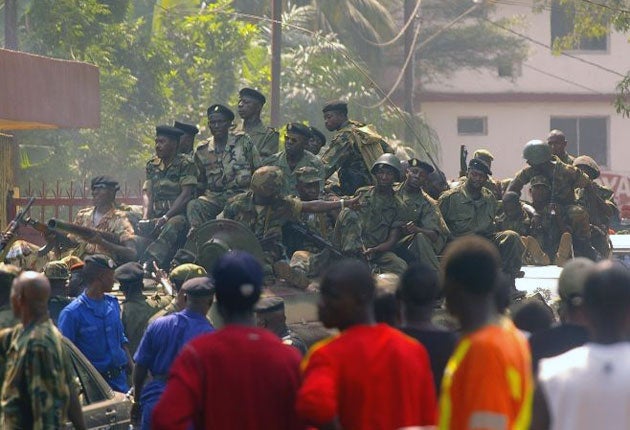Military seizes power after death of Guinea's 'big man'
Mystery illness ends 25 years of tyrannical rule

General Lansana Conté, one of Africa's last "big men", was pronounced dead yesterday, sparking a succession battle in the impoverished west African country of Guinea.
The President, who was famously so paranoid that he would not confirm his own age, had held power since leading a coup in 1984 and was believed to have been in his seventies.
Within hours of the dictator's death, a junior army officer representing the "National Council for Democracy" made a broadcast on state radio and television announcing that the council was taking over. "The government is dissolved," said Captain Moussa Camara, the apparent coup leader.
"The institutions of the republic are dissolved... From this moment on, the council is taking charge of the destiny of the Guinean people."
The Prime Minister, Ahmed Tidiane Souaré, contradicted the claim, announcing in a state broadcast that he was inside his office and that his government had not been dissolved.
Soldiers and three tanks were later seen approaching his office but their aims and allegiance were unclear.
The army head, General Diarra Camara, no relative of the coup leader, said he thought the mutinous soldiers were "in a minority" in the army.
Much of the confusion is attributable to the lack of any succession plan by General Conté, whose aims extended only as far as the end of his own life.
He ruled the former French colony for almost 25 years, one of a dwindling band of so-called "big men" which includes Gabon's Omar Bongo and Zimbabwe's Robert Mugabe, who have resisted all efforts to unseat them.
Like Mr Mugabe, General Conté used rigged elections and referendums to disguise authoritarian rule and remove constitutional term limits.
The nature of his illness was unknown. He took over in a bloodless coup from the previous president, Ahmed Sékou Touré, when Mr Sékou Touré died during an operation in New York. Formerly an officer in the French army, General Conté was a chain-smoking diabetic with well-known health problems. The capital, Conakry, has been awash with rumours of his deteriorating health but when a newspaper published a photograph of him struggling to stand up, the editor was arrested and the paper had to print a different photograph showing the leader to be in good health.
Similar rumours at the election in 2003 prompted him to make a television address in which he said: "Everybody dies. Even the Prophet died. I will die when Allah wants me to."
Guinea is a potentially rich country with fertile uplands and naturally irrigated coastal plains that should be the mainstay of an agricultural economy. In addition to recent oil finds, it has vast deposits of iron ore and half of the world's bauxite aluminium ore.
Despite this, most of the population lives on less than $1 a day and human rights abuses have been rife during Guinea's 50 years of independence.
More than 150 protesters were killed last year after General Conté's deeply unpopular presidential guard opened fire on a public march.
Mr Sékou Touré, independent Guinea's first leader, became a pan-African hero in 1959 when he snubbed France's offer of a watered down independence in return for financial assistance. Foreign mining interests have been largely unaffected by the political instability and poverty and the money generated from these concessions has created a tiny ultra-rich elite.
Increasing unrest has raised concerns that a violent battle could be waged to succeed the dead President.
The National Assembly president, Aboubacar Somparé, who under the constitution should take over as the interim head of state, said the outcome of the attempted coup was unclear and that the group responsible for it represented only "part" of the army.
There are some signs that the young officers have public support, with locals cheering "president, president" at soldiers in passing tanks.
Earlier in the day, the coup leader Capt Camara, cited what he called widespread corruption and a "catastrophic economic situation" to justify dissolving the government.
He said that the council would oversee the appointment of a new president and told civilians to stay inside.
Join our commenting forum
Join thought-provoking conversations, follow other Independent readers and see their replies
Comments
Bookmark popover
Removed from bookmarks